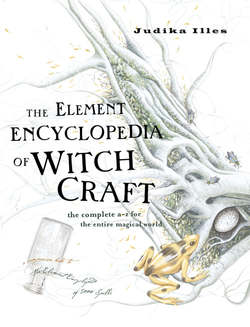Читать книгу The Element Encyclopedia of Witchcraft: The Complete A–Z for the Entire Magical World - Judika Illes - Страница 135
Wolfsbane (Aconite napellus, Aconite vulparia)
ОглавлениеAlso known as aconite, blue rocket, friar’s cap, monkshood and Venus’ chariot, wolfsbane is among the deadliest of plants and very closely identified with witchcraft. It is indigenous to Eastern Europe, but was eventually grown in ancient Greece, from whence it spread to Italy and is now found as far afield as the British Isles.
Its active alkaloid is aconitum, a very potent poison. One fifth of a grain of aconitum is sufficient to produce a fatal dose. Controversy exists about whether it produces a psychotropic effect. It’s impossible to determine for sure because at present, with existing knowledge, wolfsbane is basically impossible to use. Whether it was ever genuinely used or whether those formulas calling for it are just full of bravado is equally impossible to tell. Many spells suggest brewing it, although just because a spell is “traditional” doesn’t mean anyone actually ever cast it (or at least not successfully!).
Wolfsbane is so poisonous that even handling the plant causes skin irritation and is potentially dangerous.
Wolfsbane is so poisonous that having ritually bathed the plant, it’s no longer safe to even put your hands in the water, let alone ingest it.
That said, few plants are as identified with witchcraft as wolfsbane.
Its natural habitat is mountains, however it can be cultivated and it will wander. It blooms in the summer. Wolfsbane is a very beautiful plant with lush flowers and is thus a favorite of traditional poison gardens. It was used to represent the dangerously alluring witch, the femme fatale, whose beauty masked her innately poisonous nature.
Every part of the plant is deadly, most especially the root. The name wolfsbane derives from attempts at wolf eradication. Gaulish Celts and Chinese used it as arrow poison, and the ancients concurred that aconite was the deadliest of their known poisons.
Wolfsbane is sacred to Hecate. Its origin is sometimes attributed to Cerberus, the threeheaded guard dog of Hades, who may or may not be Hecate the dog goddess in disguise. Wolfsbane allegedly sprang up where Cerberus’ drool touched Earth.
